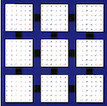1 SUBROUTINE pclawil( II, JJ, M, A, DESCA, H44, H33, H43H34, V )
10 COMPLEX H33, H43H34, H44
14 COMPLEX A( * ), V( * )
116 INTEGER BLOCK_CYCLIC_2D, CSRC_, CTXT_, DLEN_, DTYPE_,
117 $ LLD_, MB_, M_, NB_, N_, RSRC_
118 parameter( block_cyclic_2d = 1, dlen_ = 9, dtype_ = 1,
119 $ ctxt_ = 2, m_ = 3, n_ = 4, mb_ = 5, nb_ = 6,
120 $ rsrc_ = 7, csrc_ = 8, lld_ = 9 )
123 INTEGER CONTXT, DOWN, HBL, ICOL, IROW, JSRC, LDA, LEFT,
124 $ MODKM1, MYCOL, MYROW, NPCOL, NPROW, NUM, RIGHT,
127 COMPLEX CDUM, H22, H33S, H44S, V1, V2
130 COMPLEX BUF( 4 ), V3( 1 ), H11( 1 ), H12( 1 ), H21( 1 )
133 EXTERNAL blacs_gridinfo,
infog2l, cgerv2d, cgesd2d
136 INTRINSIC abs, real, aimag, mod
142 cabs1( cdum ) = abs( real( cdum ) ) + abs( aimag( cdum ) )
147 contxt = desca( ctxt_ )
149 CALL blacs_gridinfo( contxt, nprow, npcol, myrow, mycol )
150 left = mod( mycol+npcol-1, npcol )
151 right = mod( mycol+1, npcol )
152 up = mod( myrow+nprow-1, nprow )
153 down = mod( myrow+1, nprow )
158 modkm1 = mod( m+1, hbl )
159 IF( modkm1.EQ.0 )
THEN
160 IF( ( myrow.EQ.ii ) .AND. ( right.EQ.jj ) .AND.
161 $ ( npcol.GT.1 ) )
THEN
162 CALL infog2l( m+2, m+1, desca, nprow, npcol, myrow, mycol,
163 $ irow, icol, rsrc, jsrc )
164 buf( 1 ) = a( ( icol-1 )*lda+irow )
165 CALL cgesd2d( contxt, 1, 1, buf, 1, ii, jj )
167 IF( ( down.EQ.ii ) .AND. ( right.EQ.jj ) .AND. ( num.GT.1 ) )
169 CALL infog2l( m, m, desca, nprow, npcol, myrow, mycol, irow,
171 buf( 1 ) = a( ( icol-1 )*lda+irow )
172 buf( 2 ) = a( ( icol-1 )*lda+irow+1 )
173 buf( 3 ) = a( icol*lda+irow )
174 buf( 4 ) = a( icol*lda+irow+1 )
175 CALL cgesd2d( contxt, 4, 1, buf, 4, ii, jj )
177 IF( ( myrow.EQ.ii ) .AND. ( mycol.EQ.jj ) )
THEN
178 CALL infog2l( m+2, m+2, desca, nprow, npcol, myrow, mycol,
179 $ irow, icol, rsrc, jsrc )
180 IF( npcol.GT.1 )
THEN
181 CALL cgerv2d( contxt, 1, 1, v3, 1, myrow, left )
183 v3( 1 ) = a( ( icol-2 )*lda+irow )
186 CALL cgerv2d( contxt, 4, 1, buf, 4, up, left )
192 h11( 1 ) = a( ( icol-3 )*lda+irow-2 )
193 h21( 1 ) = a( ( icol-3 )*lda+irow-1 )
194 h12( 1 ) = a( ( icol-2 )*lda+irow-2 )
195 h22 = a( ( icol-2 )*lda+irow-1 )
199 IF( modkm1.EQ.1 )
THEN
200 IF( ( down.EQ.ii ) .AND. ( right.EQ.jj ) .AND. ( num.GT.1 ) )
202 CALL infog2l( m, m, desca, nprow, npcol, myrow, mycol, irow,
204 CALL cgesd2d( contxt, 1, 1, a( ( icol-1 )*lda+irow ), 1, ii,
207 IF( ( down.EQ.ii ) .AND. ( mycol.EQ.jj ) .AND. ( nprow.GT.1 ) )
209 CALL infog2l( m, m+1, desca, nprow, npcol, myrow, mycol,
210 $ irow, icol, rsrc, jsrc )
211 CALL cgesd2d( contxt, 1, 1, a( ( icol-1 )*lda+irow ), 1, ii,
214 IF( ( myrow.EQ.ii ) .AND. ( right.EQ.jj ) .AND.
215 $ ( npcol.GT.1 ) )
THEN
216 CALL infog2l( m+1, m, desca, nprow, npcol, myrow, mycol,
217 $ irow, icol, rsrc, jsrc )
218 CALL cgesd2d( contxt, 1, 1, a( ( icol-1 )*lda+irow ), 1, ii,
221 IF( ( myrow.EQ.ii ) .AND. ( mycol.EQ.jj ) )
THEN
222 CALL infog2l( m+2, m+2, desca, nprow, npcol, myrow, mycol,
223 $ irow, icol, rsrc, jsrc )
225 CALL cgerv2d( contxt, 1, 1, h11( 1 ), 1, up, left )
227 h11( 1 ) = a( ( icol-3 )*lda+irow-2 )
229 IF( nprow.GT.1 )
THEN
230 CALL cgerv2d( contxt, 1, 1, h12, 1, up, mycol )
232 h12( 1 ) = a( ( icol-2 )*lda+irow-2 )
234 IF( npcol.GT.1 )
THEN
235 CALL cgerv2d( contxt, 1, 1, h21( 1 ), 1, myrow, left )
237 h21( 1 ) = a( ( icol-3 )*lda+irow-1 )
239 h22 = a( ( icol-2 )*lda+irow-1 )
240 v3( 1 ) = a( ( icol-2 )*lda+irow )
243 IF( ( myrow.NE.ii ) .OR. ( mycol.NE.jj ) )
246 IF( modkm1.GT.1 )
THEN
247 CALL infog2l( m+2, m+2, desca, nprow, npcol, myrow, mycol,
248 $ irow, icol, rsrc, jsrc )
249 h11( 1 ) = a( ( icol-3 )*lda+irow-2 )
250 h21( 1 ) = a( ( icol-3 )*lda+irow-1 )
251 h12( 1 ) = a( ( icol-2 )*lda+irow-2 )
252 h22 = a( ( icol-2 )*lda+irow-1 )
253 v3( 1 ) = a( ( icol-2 )*lda+irow )
256 h44s = h44 - h11( 1 )
257 h33s = h33 - h11( 1 )
258 v1 = ( h33s*h44s-h43h34 ) / h21( 1 ) + h12( 1 )
259 v2 = h22 - h11( 1 ) - h33s - h44s
260 s = cabs1( v1 ) + cabs1( v2 ) + cabs1( v3( 1 ) )
263 v3( 1 ) = v3( 1 ) / s

